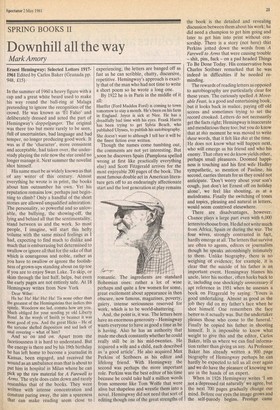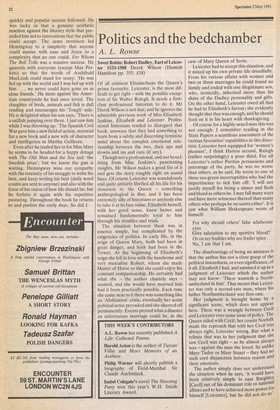SPRING BOOKS II
Downhill all the way
Mark Amory
Ernest Hemingway: Selected Letters 19171961 Edited by Carlos Baker (Granada pp. 948, £15) In the summer of 1960 a heavy figure with a cap and a great white beard used to make his way round the bull-ring at Malaga pretending to ignore the recognition of the crowd, He was known as 'El Falso' and deliberately dressed and acted the part of Hemingway's doppelganger. The original was there too but more rarely to be seen, full of uncertainties, bad language and bad temper, no longer producing good work. It was as if the 'character', more consistent and acceptable, had taken over, the understudy playing the role now the star could no longer manage it. Next summer the novelist shot himself.
His name must be as widely known as that of any writer of this century. Almost everything he wrote is in print, the books about him outnumber his own. Yet his reputation remains low, perhaps just beginning to climb? Only a handful of the short stories are allowed unqualified admiration. The personality, so powerful and so unlovable, the bullying, the showing-off, the lying and behind all that the sentimentality, stand between us and the work. So most people, I imagine, will start this hefty volume with the same mixed feelings as I had, expecting to find much to dislike and much that is embarrasing but determined to swallow or ignore all that for the sake of that which is courageous and noble, rather as you have to swallow or ignore the foolishness of grown-ups standing about on tip toe if you are to enjoy Swan Lake. To skip, or skim through the last half, helps, but even the early pages are not entirely safe. At 18 Hemingway writes from New York
Dear Wilse; Ha ha! Ha! Ha! Ha! Ha! Tis none other than the greatest of the Hemingsteins that indicts this epistle. Woodrow me lad, comma how are you. Much obliged for your sending ye old Liberty Bond. In the words of Smith ye beamer it was most good of you. And the great Hicks He of the tortoise shelled disposition and sad lack of anal covering what of him?
And so on and on. Apart trom the facetiousness it is hard to understand. But the energy is there and by his 19th birthday he has left home to become a journalist in Kansas, been engaged, and received the wound as an ambulance man that is about to put him in hospital in Milan where he can pick up the raw material for A Farewell to Arms. The style does calm down and rarely resembles that of the books. They were Written with intense concentration and constant paring away, the aim a spareness that can make reading seem close to experiencing; the letters are banged off as fast as he can scribble, chatty, discursive, repetitive. Hemingway's approach is exactly that of the man who had not time to write a short poem so he wrote a long one.
By 1922 he is in Paris in the middle of it all:
Hueffer (Ford Maddox Ford) is coming to town tomorrow to stay a month. He's been on his farm in England. Joyce is sick at Nice. He has a dreadfully bad time with his eyes. Frank Harris has been trying to get Sylvia Beach, who published Ulysses, to publish his autobiography. She doesn't want to although I tell her it will be the finest fiction ever written.
Though the names come tumbling out, the comments are not yet interesting. But soon he discovers Spain (Pamplona spelled wrong at first like practically everything else) and Scott Fitzgerald arrives for the most enjoyable 200 pages of the book. The most famous double act in American literature gets off to an endearingly affectionate start and the lost generation at play remains romantic. The ingredients are standard Bohemian ones: rather a lot of wine perhaps and quite a few women for some, great excitement about appearance in then obscure, now famous, magazines, poverty, gaiety, intense seriousness reserved for work, which is to be world-shattering.
And, the point is, it was. The letters here have an enormous generosity — Hemingway wants everyone to have as good a time as he is having. Also he has an authority that made me check constantly whether he could really still be in his mid-twenties. He acquired a wife and a child, each described as 'a good article'. He also acquired Max Perkins of Scribners as his editor and lifelong friend. With Hemingway the second was perhaps the more important role. Perkins was the best editor of his time because he could take half a million words from someone like Tom Wolfe that were alive but shapeless and wrestle them into a novel. Hemingway did not need that sort of editing though one of the great strengths of the book is the detailed and revealing discussion between them about his work; he did need a champion to get him going and later to get him into print without censorship. There is a story (not here) that Perkins jotted down the words from A Farewell to Arms that were causing trouble — shit, piss, fuck — on a pad headed Things To Be Done Today. His conservative boss Charles Scribner remarked that he was indeed in difficulties if he needed reminding.
The rewards of reading letters as opposed to autobiography are particularly clear for these years. The curiously spelled A Moveable Feast, is a good and entertaining book, but it looks back in malice, paying off old scores and sometimes trying to set the record crooked. Letters do not necessarily get the facts right; Hemingway is inaccurate and mendacious there too; but you do know that at this moment he was moved to write these words, that it felt like this at the time. He does not know what will happen next, who will emerge as his friend and who his enemy. That often we do know yields other, perhaps small pleasures. Doomed happiness is touching and his first wife Hadley sympathetic, so mention of Pauline, his second, carries threats for us they could not anticipate. 'Don't worry about your son's cough, just don't let Ernest off on holiday alone', we feel like shouting, as at a melodrama. Finally the switching of tones and topics, pleasing and natural in letters, would seem contrived elesewhere.
There are disadvantages, however. Chance plays a large part even with 6,000 lettersto choose from. He did not write much from Africa, Spain or during the war. The four wives, strongly contrasted in fact, hardly emerge at all. The letters that survive are often to agents, editors or journalists though he speaks astonishingly intimately to them. Unlike biography, there is no weighing of evidence; for example, it is clear that the suicide of his father is an important' event. Hemingway blames his uncle, later his mother, often harks back to it, including one shockingly unnecessary if apt reference in 1951 when he assesses a book on Fitzgerald by saying: 'Yours is good undertaking. Almost as good as the job they did on my father's face when he shot himself. One remembers the face better as it actually was. But the undertaker pleases those who come to the funeral.' Finally he copied his father in shooting himself. It is impossible to know what weight to give this and the editor, Carlos Baker, tells us where we can find information rather than giving us any. As Professor Baker has already written a 900 page biography of Hemingway perhaps he can hardly be expected to tell us all over again and we do have the pleasure of knowing we are in the hands of an expert.
When in 1926 Hemingway writes 'I am not a depressed rat naturally' we agree, but the next 700 pages gradually change our mind. Before our eyes the image grows and the self-parody begins. Prestige came quickly and popular success followed. He was lucky in that a genuine aesthetic reaction against the literary style that preceded him led to innovations that the public could accept. The same revulsion led Hemingway to a simplicity that anyone could master with ease and Joyce to a complexity that no one could. For Whom The Bell Tolls was a massive success. He quarrels with everyone (except Max Perkins) so that the words of Archibald MacLeish could stand for many: `He was fed up with the world and I was fed up with him . . . we never could have gone on as close friends.' He turns against the American countryside he had once loved. The slaughter of birds, animals and fish is dull reading and encourages his 'Tough' side. He is delighted when his son says, 'There is a sailfish jumping over there. I just saw him while I was throwing up.' The Spanish Civil War gave him a new field of action, material for a new book and a new wife of character and intelligence in Martha Gellhorn.
Even after he traded her in for Miss Mary he seems to be headed for a happy dotage with The Old Man and the Sea and 'the Swedish prize': but we know the gun is waiting. Hemingway wins our sympathy with the intensity of his struggle to write his best, and keep writing his best (daily word counts are sent to anyone) and also with the force of his vision of how life should be; but he forfeits it again with his repetitive posturing. Throughout the book he returns to and prefers the early days. So did I.



















































































 Previous page
Previous page